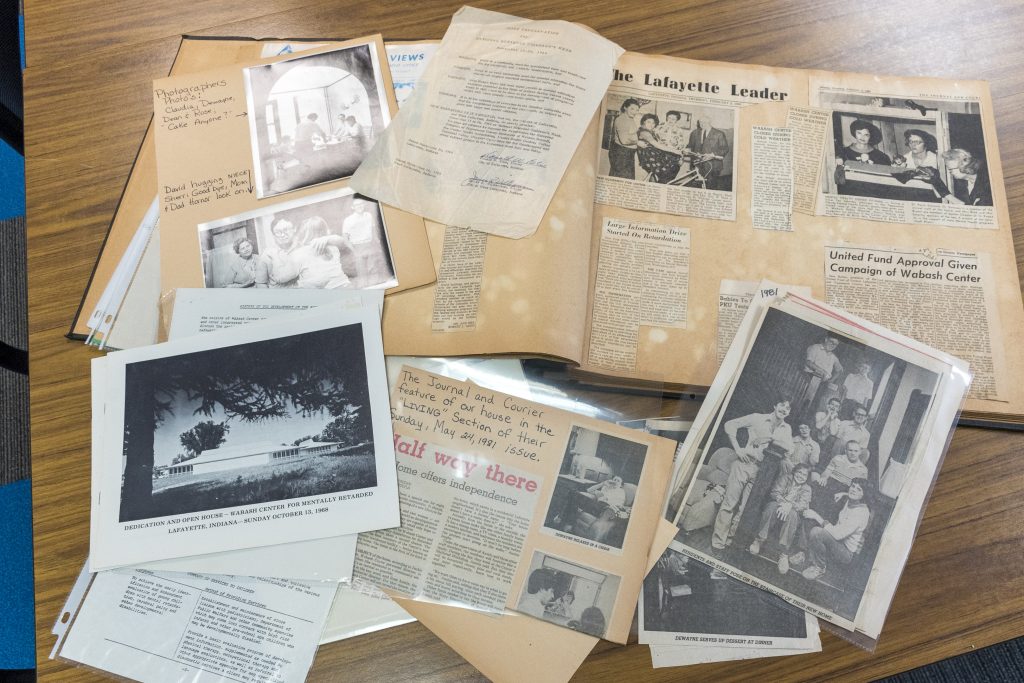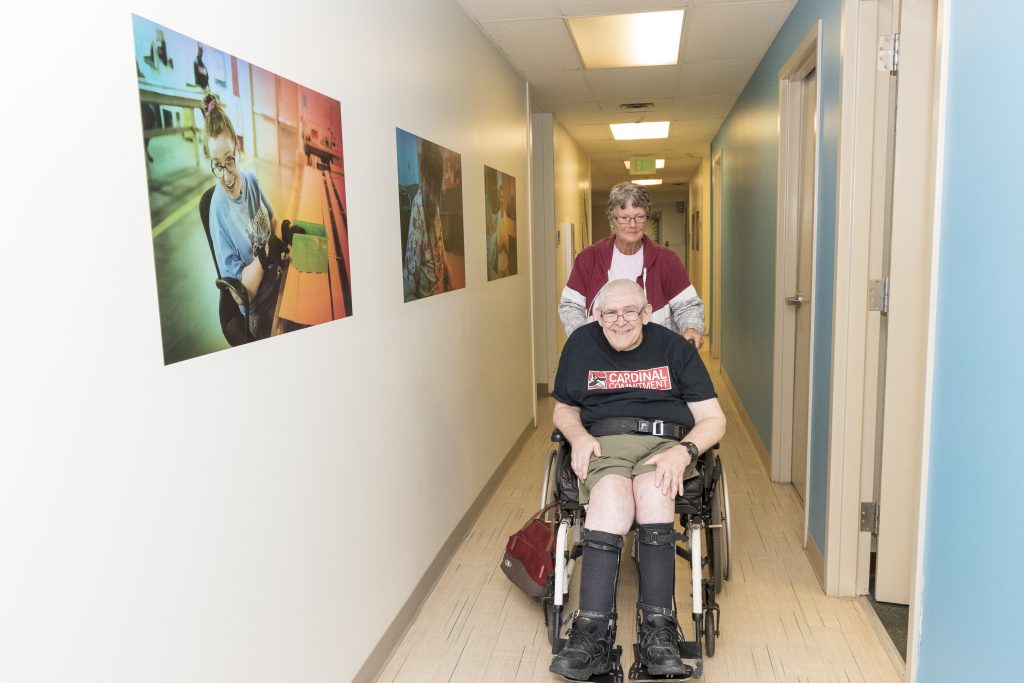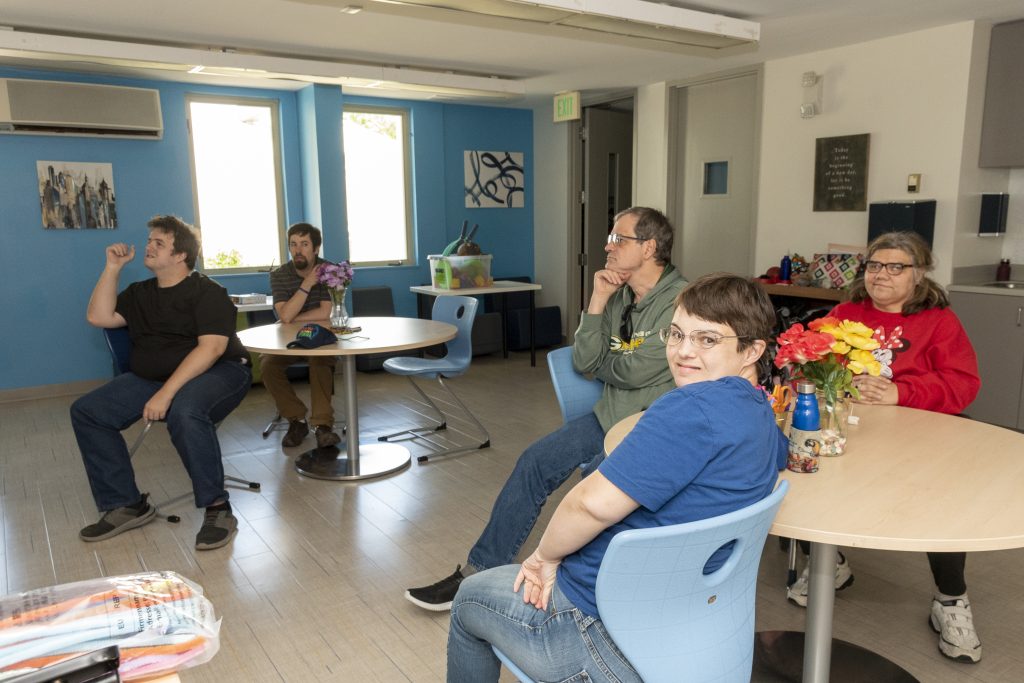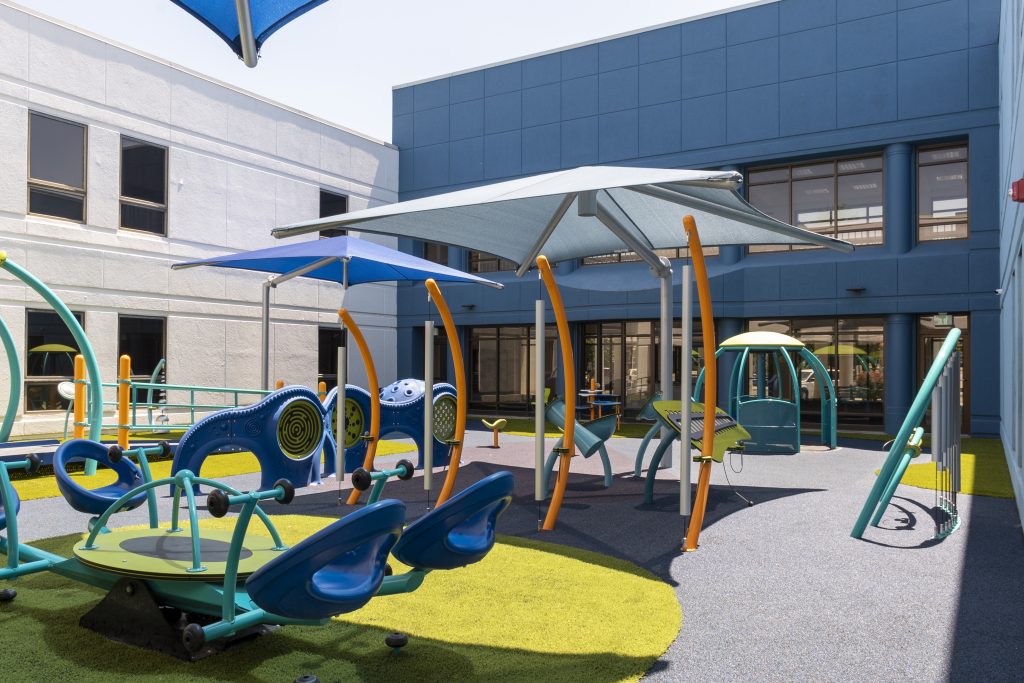BY AMY LONG
PHOTOS BY CHRISTINE PETKOV

In a cheerful room in the Wabash Center program building, David Doyle shows off a bank of personal computers, a flat-screen TV hooked up to multiple gaming systems, and a closet packed with board games. He is giving a tour of Wabash Center’s Adult Day Services wing — a cluster of comfortable, colorful activity rooms where Doyle spends most weekdays.
A nonprofit agency that serves people with disabilities and special needs, Wabash Center offers an array of programs, including after-school activities, employment services and supported living. The Adult Day Services facility takes up just a small part of Wabash Center’s spacious program building on Greenbush Street, on Lafayette’s north side, and provides adults with special needs a safe place to socialize, participate in creative activities and practice life skills. In March, Wabash Center observed a grand re-opening of the space after a four-year, $300,000 renovation. The event kicked off a year of celebration, as Wabash Center marks 70 years since its inception in 1953.
Doyle, 71, uses a wheelchair and speaks just a few words at a time. He communicates mostly with his gentle smile and expressive eyes, which twinkle beneath a pair of bushy eyebrows. With help from a Wabash Center staff member, Doyle leads a tour of the new space, where once uninspiring classrooms have been transformed into engaging activity rooms with state-of-the-art technology.
In the game room, dubbed “The Hub,” Doyle likes to watch “The Golden Girls” on a personal computer. In the library, he enjoys working on puzzles. In the Sensory Room, a space outfitted with rope swings, comfy crash pads and engrossing tactile displays, Doyle is captivated by a light board that simulates an infinity tunnel. And in the Duke Energy “Smart Home,” which includes a homey living space as well as a nicely equipped kitchen, Doyle wheels up to the low-slung center island — an ideal height for people using wheelchairs — and whips up a batch of dirt pudding.
Doyle has been enrolled in the Adult Day Services program at Wabash Center for 56 years, since he was 15 years old, and he has witnessed much of the organization’s growth firsthand. He started receiving services at Wabash Center in 1967. The Greenbush Street program building — Wabash Center’s first permanent facility — opened the following year. At that time, the center served about 100 individuals with intellectual disabilities across six nascent programs in diagnostic services, therapy, training, education, day custodial care and sheltered employment.
Today, Wabash Center offers the most comprehensive array of services in west-central Indiana for clients with disabilities and special needs — from school-aged interventions to supportive programs for adults — helping them lead fulfilling lives with as much independence as possible.
“There’s about 100 providers of this kind of service in Indiana — some of them provide a small sliver [of services], and some provide a wider array,” says Jason McManus, Wabash Center CEO since 2016. “We’re one of the few that I feel serve nearly the entire continuum of care, from kids newly diagnosed with autism at age 2 or 3 all the way to individuals approaching the end of their life.”


The early years
Perhaps the organization’s most dramatic transformation happened in its earliest years — in the decade and a half before Doyle arrived.
In the early 1950s, years before special education was widely offered in public schools, families had almost no access to support for children with intellectual and developmental disabilities.
“Most of the parents [of children with intellectual disabilities] reported their family physicians advised them to institutionalize their children and generally offered little hope their children would be able to achieve even minimal daily living skills and social adjustment,” noted James R. Tilton, who served as Wabash Center’s executive director from 1965 to 1990, and who documented the organization’s origins in a slim booklet titled “A History of Wabash Center.”
Frustrated with the lack of resources and opportunities available to their children with special needs, two local families posted an ad in the Journal & Courier in search of others facing similar challenges.
Several families answered the call, and together they formed a support group that quickly morphed into an ad-hoc school for children with special needs: The Wabash School opened in a rent-free room at the YWCA in 1953, with an initial enrollment of 11 students. For 15 years, the fledgling organization bounced around between eight different makeshift spaces across Greater Lafayette, including the basement of an unfinished United Pentecostal Church and the abandoned Tippecanoe Elementary School on South Third Street — a decaying 1874 building that had been slated for demolition until Wabash Center moved in.
Each year, and with each move, the organization enrolled more and more students, and slowly added teachers. As the school expanded, the stakeholders spent those early years drumming up community support, making friends in local government and building relationships with local businesses. In 1956, Wabash School became a member agency of the United Fund (now United Way). The organization also cultivated a longstanding partnership with Purdue University, which provided a volunteer base and access to services such as speech therapy.
By the early 1960s, the school, which had begun to serve older teens and young adults in an employment workshop, became known as “Wabash Center.” Within a few years, it had become clear that the organization needed a permanent space. With support from community leaders at the local and state levels, Wabash Center secured government grants and raised enough additional money to pay for the $450,000, 18,000-square-foot program building on a five-acre campus at Greenbush and 20th streets. The new facility was officially dedicated in October 1968.
It was the beginning of the Wabash Center we know today. Through subsequent decades, Wabash Center continued to expand, completing a new administration building in 2002, and continually adding or adapting services to keep up with new laws and ever-evolving best practices.
Wabash Center today
Today, 70 years after its incorporation, Wabash Center offers a wide range of programs and serves about 800 individuals with disabilities and their families in vibrant spaces and with generous community support.
Now more than ever, services are needed for people with developmental disabilities. According to the Centers for Disease Control and Prevention, around 1 in 36 children in the U.S. will be diagnosed with autism spectrum disorder this year, up from 1 in 68.
n 2010. And in a study conducted from 2009 to 2017, the CDC reports, about 1 in 6 children (17 percent) age 3 to 17 were diagnosed with a developmental disability, including ADHD, autism spectrum disorder and intellectual disabilities, as reported by parents. The percentage increased from 16.2 percent in 2009-2011, to 17.8 percent in 2015-2017.
Although people with disabilities and their families have more options and agency today than they did 70 years ago, they still face challenges, including long waiting lists for care, complicated Medicaid waiver applications and piecemeal therapy plans. Through it all, Wabash Center is a beacon of hope for families seeking support.
“A couple of things make Wabash Center unique,” says McManus. “One is that we’ve been around for 70 years. I feel like we have some longevity in this space and some experience in this space. Not that we’re experts. We really believe that we’re co-experts in the care of the folks we’re supporting, and we do that in partnership with the families and guardians.
“Another thing that I think sets us apart is that near full continuum of care,” McManus adds. “And that means that someone can enter in our services at any point along that full continuum, but also that we could potentially serve somebody for their entire life … and I think that has some uniqueness.”
Besides the Adult Day Services program, which offers adults with special needs, including David Doyle, a place to develop life skills and make social connections, the Wabash Center flagship program building houses the Enterprise Services division, which helps people with disabilities and special needs transition to community-based employment. Wabash Center contracts with local businesses, including CAT Logistics, Maximus Logistics and Wabash (formerly Wabash National) to offer jobs in kit-assembly or piece work in Wabash Center’s sprawling workshop. In addition, individuals with special needs can perform janitorial services off-site for companies such as Caterpillar, Inc.
Through the organization’s Supported Living program, individuals with special needs have access to safe, affordable housing. Wabash Center owns 32 homes throughout Tippecanoe County, where clients live either on their own or with roommates and receive support from Wabash Center staff.
Wabash Center also offers a Family Supports program that matches trained caregivers with families who need help providing care for their loved ones. The center’s Guardianship Services program trains volunteer advocates and pairs them one-on-one with adults with special needs and area seniors.
In 2019, Wabash Center opened Grant’s House, a nearly 50,000-square-foot, state-of-the-art facility, in a former medical office building on Salem Street, less than a mile from the center’s Greenbush Street campus. The bright, open space — designed specifically for kids and young adults with disabilities — houses Wabash Center’s Youth Services programs, including an after-school program, a summer day-camp and a day program for emerging adults.
Grant’s House was made possible with a $2.4 million grant from North Central Health Services, as well as hundreds of thousands of dollars in grassroots community support, and honors the life and legacy of Grant House, who worked in the Wabash Center Enterprise Services workshop and passed away in 2015.
Looking ahead
In the coming months, Wabash Center will add additional programs to its array and will continue to close gaps in the care continuum. Later this year, the organization will open an Applied Behavior Analysis (ABA) clinic in an open wing of the Grant’s House building. ABA therapy helps children as young as 3 who are on the autism spectrum develop social and emotional skills through one-on-one intervention.
Melissa Strong, who chairs the Wabash Center board of directors, hopes that the launch of the ABA clinic is only the first step in opening up more options to families with children on the autism spectrum. Strong’s 10-year-old son, Cooper, has autism, and she knows firsthand how difficult it is to manage therapy appointments and case manager meetings, as well as a full-time job and a family with other young children.
Strong envisions bringing additional therapy services specifically for children on the autism spectrum under the Wabash Center umbrella, to streamline access. “How can we make this better for families and break down these barriers and bring these services together?” she says. “[The ABA clinic] is a huge first step to bringing this service model, that doesn’t exist today, to this community. And I’m super excited about it.”
Also in the works: A furniture thrift store offering a collection of gently used furniture for sale exclusively to clients of Wabash Center. The venture, called Jessie’s Attic, in honor of Jessica Steuterman, a Wabash Center client, has been set up in a repurposed storage room of Wabash Center’s program building and is due to open in the fall.
The project was the brainchild of Jessica’s mother, Erika Steuterman, who had been active on the Wabash Center board of directors for many years, and whose older daughter, Erin, also receives services at Wabash Center.
“We thought, ‘Well maybe we can do something so that people with disabilities who are starting out in their first apartment or first home … have a way to get what they need at a very low cost,’” says Steuterman. The retired U.S. Air Force major general announced in May her plans to bequeath to Wabash Center a $2.5 million legacy gift that will go toward Supported Living and Guardian Services, as well as Jessie’s Attic. The gift is the largest of its kind in the organization’s history.
Of course, by definition, Steuterman won’t be able to witness the impact of her legacy gift. But by opening the thrift shop this year, she can make an immediate difference in the lives of Wabash Center clients. “It will be fun to see it, and to see the good that it does,” Steuterman says.
“This is a lot of work, and it will continue to be a lot of work,” Steuterman adds. “And if it grows, it will take on a life of its own. But Wabash Center is the size of organization that recognizes the importance of this service.”
McManus says that his approach to providing services to people with disabilities is necessarily innovative. “We should be open to new ideas, because even though we’ve been doing this for 70 years, we don’t know everything,” McManus says. “I really feel like it’s part of our job — and my job personally — to be receptive to that and see where it takes us, knowing that we have the size and the resources to take some calculated risks like that.
“And I think that it’s fun to partner with people who have an idea that they’re passionate about, and can demonstrate that it will have some efficacy and impact. I think that’s part of our responsibility.” ★





